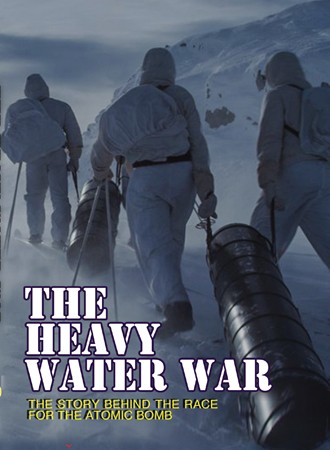
The Heavy Water War 2018
Distributed by Film Ideas, 308 North Wolf Rd., Wheeling, IL 60090; 800-475-3456
Produced by Cyrille Perez, Gilles Perez, and Dominique Monteiro
Directed by Nicolas Jallot
Streaming, 52 mins
College - General Adult
Nuclear Weapons; Physics; World War II
Date Entered: 08/04/2020
Reviewed by Kathleen H. Flynn, Science Librarian, University at AlbanyThe film The Heavy Water War highlights the rarely discussed ‘heavy water war,’ or the battle between the Germans and the Allies over a source of heavy water during World War II. Heavy water, or deuterium oxide, was desired for its possible use as a neutron moderator. This battle was sparked by the discovery of nuclear fission and the decision by the Allied Powers to begin researching nuclear power with the assumption that the Germans were also racing to develop nuclear weapons. Throughout the war, the Allies were mostly in the dark regarding Germany’s progress with nuclear weapons. Therefore, they were involved in several sabotage efforts to slow down their progress. These efforts were centered around the Norsk Hydro Factory in Norway, the only factory producing large quantities of heavy water at the start of the war. These efforts were led by French scientist Frederic Joliot-Curie, French banker Jacques Allier, and Norwegian resistance members.
After the war, a historical film called Operation Swallow: The Battle for Heavy Water was created about these events that starred the real participants and was intended to be as accurate as possible. Clips from that film are dispersed throughout The Heavy Water War. In addition to those clips, the film features interviews with experts. Those interviewed consist of historians, physicists, friends of the Norwegian resistance members, and relatives of some of the important figures of this conflict. The first relative is the Director of Research at CNRS and daughter of Frederic and Irene Joliot-Curie, and the second is a physician who is also the granddaughter of Jacques Allier. The film has English narration, but those interviewed mostly speak in French, German, or Norwegian. Although the English subtitles are in white typeface, they are rarely difficult to read. The production of the film is professional albeit a little slow paced.
One criticism of the film is that there is no discussion on other nuclear moderators, such as graphite. The film maintains that heavy water and the Norwegian factory were essential to research in nuclear power, yet there is a sudden transition at the end of the film to discuss the Hiroshima bombing. Viewers may wonder where the United States found heavy water since they weren’t discussed during the film. Taking an additional minute to elaborate on that would have been nice. However, overall, the film would be a worthy addition to a collection.
Recommended for college courses that focus on the history and development of nuclear power or weapons.